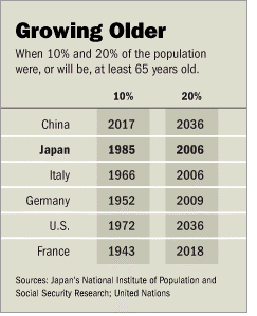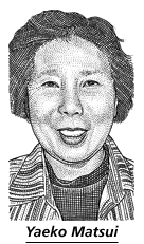|
|
Fast-Aging Japan Keeps Its Elders On the Job Longer
By Sebastian Moffett, The Wall Street Journal
June 15, 2005
Japan
Four years ago in Nakatsugawa, Japan, Kato Manufacturing Co. faced a problem that much of Japanese industry soon will come up against: a dearth of working-age people for its factories. With Japan's birth rate declining fast for decades, the pool of young workers was shrinking. And those who grew up in this small town in central Japan were fleeing to look for jobs in the cities.
So, the small metal-parts maker tried out a source of labor it had never considered before: the elderly. They came running. When Kato placed inserts in the local paper inviting "keen people over 60" to apply, the company was flooded with 100 candidates, even though the jobs were for weekends.

"There were many more applicants than I thought," says Keiji Kato, the company's president. What's more, he got away with paying them only half as much as regular employees.
Kato is dealing with a problem that's just starting to sweep the world -- an aging population combined with a shrinking work force. The problem is unprecedented in modern times, and its most predictable effect would be to sap economic growth: If a country's work force declines and higher production per worker doesn't make up for this, its economy will shrink.
Though Japan will run into this quagmire first, other nations are going to have to deal with it soon as well. In Japan, the proportion of people who are over 65 years old will reach 20% in 2006, up from 10% just 20 years ago. Italy, too, will be in the same position in 2006, and Germany in 2009. The U.S. is better off -- not slated to reach that proportion until 2036 -- because of a higher birthrate and immigration, but it still is struggling to figure out how to finance Social Security in a grayer future.
Unlike the U.S., Japan is reluctant to rely on large-scale immigration to bolster the work force. Instead, it is trying another strategy: enticing the elderly to work longer before receiving retirement benefits, effectively dealing with old age by making it start later.

That might sound like a move that goes against recent worldwide trends. Western Europeans, for example, have been retiring earlier over the past quarter century, encouraged by governments that thought this would ease chronic unemployment.
But if Japan succeeds in using the elderly to solve its looming labor shortage, it could provide a new policy tool for other nations. There are some hopeful signs. Many Japanese workers are enthusiastic about working longer, even though the official retirement age remains a relatively young 60. The International Labor Organization says 71% of Japanese men ages 60 to 64 work, mostly in postretirement jobs. That compares with 57% of American men and just 17% of Frenchmen in the same age group. Asked their ideal retirement age, 72% of Japanese said either "about 65" or "about 70," according to a 2001 Japanese government report. Americans, Germans and Swedes mainly chose "about 60" or "about 65."
"I want to work as long as I'm healthy," says Sachiko Ichioka, a 67-year-old widow who prepares ventilation-equipment parts for shipment at Kato Manufacturing. "The extra money means I can go on trips, and I'm not a burden on my children."
Japan's declining work force comes from two trends linked with economic development. Better diet and health care have helped raise Japan's average life expectancy at birth to 82, the highest in the world. Meanwhile, women in Japan are having fewer and fewer children -- an average of 1.28 each, compared with 2.04 in the U.S. -- so there are fewer people available to join the work force.
These trends are also rippling elsewhere in the world. Italy and Spain, for example, have fertility rates roughly the same as Japan's. South Korea's recently plunged even lower, to 1.19. At the other end of life, the Chinese are living to an average of 71 years old, while Americans and most Western Europeans on average make it to their late 70s. Younger populations in developing countries like Brazil and India give their economies a demographic advantage -- but only a temporary one, as the same birthrate and life-expectancy trends are taking hold there amid growing prosperity.

Keeping the elderly at work could help to roughly maintain the size of Japan's work force. According to calculations by Atsushi Seike, an economist at Tokyo's Keio University, the country's lower birth rate means the number of Japanese in their 20s will decline by 3.2 million over the next decade. But extending everyone's working life until 65 would keep two million more in the work force, which currently totals about 66 million. A further million or so workers could be women, who traditionally have stayed at home in Japan but increasingly are choosing to work.
"Together, these two would make up for the loss of people in their 20s," says Mr. Seike. He says Japan has a good chance to keep people in the work force and stop the decline, because until a few decades ago, people worked until they died. "Lots of adults now have parents like this, so they don't have the idea of retired life," he says.
Japan's government hopes that people working longer will help save its increasingly burdened pension system from going bust, and it is making benefits available later and later. In 2000, Japanese could draw a full state pension at 60. But by 2025, after a gradual phase-in of later retirement ages, they won't get any until they are 65. What's more, premiums paid by workers are set to rise while payouts fall.
To help workers to cope with this, Japan passed a law last year that requires companies by 2013 to raise their retirement age to 65 from 60 or rehire their retiring workers.
The new measures could be a strain for employers. In a country where forced layoffs are a last resort, large companies traditionally have relied on retirement to reduce payrolls. They were just about to enjoy a big cut in personnel costs because of the mass retirement of Japan's baby boomers, who were born between 1947 and 1949 and account for 5.2 million members of the work force. Early signs suggest large corporations will drag their feet in raising their retirement ages, hurting the effectiveness of the policies. Violators of the new law would face only "administrative guidance," not penalties. And, unlike the U.S., Japan has no law against discrimination based on age. "There was much opposition from corporations" to the new retirement law, says university professor Mr.
Seike.
So far, smaller manufacturers like Sanwa Electric Co. are the most eager to take on older workers. Tokyo-based Sanwa makes pressure-sensitive switches used in the brakes of bullet trains. President Tetsuo Hayashi realized a decade ago that with Japan's working-age population set to decline, companies like his would have trouble finding staff. Younger Japanese prefer to avoid factory work and like the security of a larger corporation.
So, Mr. Hayashi tries to keep staffers after they have passed the mandatory retirement age. The average age of his 70 employees is 50 -- about six years older than it was 15 years ago, he says. Ten of them are over 60.

"Thirty years ago, people retired at 55, and then it was 60," he says. "Now, we offer to rehire all workers till they're 65, and for workers over 65, we decide case by case."
Mr. Hayashi says people's productive capacity doesn't change after they reach 60. But he was concerned about the physical burden on older workers, and the company adapted factory machines to relieve the strain on aging joints. Sanwa made one device from four screwdrivers, which are set together in a block, to reduce awkward wrist movements.
On a recent day, Yumiko Hirai, 62, lowered the block of screwdrivers onto a piece of metal using a lever, and then tightened the screws. She had already learned a lot of the job during years of working at Sanwa, so she jumped at the opportunity to continue there until she was 65.
"I can do the work sitting down, so it's not hard physically," she says. "So I want to work till I'm 65."
Akita Kogyo Co., an auto-parts maker near Toyota Motor Corp.'s headquarters in central Japan, decided to employ older workers as a way of adapting to the grayer future. Moreover, President Masayuki Matsui, himself 60 and planning to keep working for several years, thinks elderly Japanese have a deeply ingrained work ethic. "Older people have good manners and a strong sense of responsibility," he says.
So, when Akita won a contract to supply seat frames for a Toyota sport-utility vehicle in 2000, it decided that out of 50 new workers needed, half should be over 55. It started to rig its factories with elderly-friendly devices, such as an automated mold exchanger for metal presses. This slides a new mold into a press, thus avoiding a long, difficult operation involving heavy lifting or cranes.
At one workstation, Saburo Maeno, 69, used a machine recently to crank out wire frames. They used to fall on the floor as they came out of the machine. But now there's a rack that catches them, so he doesn't have to strain his back picking them up.
Mr. Maeno, a former sailor in Japan's Maritime Self-Defense Force, says he has no problems with the physical burdens of factory work. "I work to stay healthy," he says, raising his arms in a bodybuilder's double-biceps pose. He says not eating too much also keeps him in shape, as does a glass of water on waking and before going to bed at night.
Older workers at Akita get about two-thirds the pay of regular employees. In addition, the company currently gets a government subsidy designed to encourage businesses to employ more older workers. Though this might disappear when older workers become the norm in Japan, managers think it's worth preparing their factories for what's to come. "People will have to work till 65 in the future," says Mr. Matsui. "The thinking about retirement at 60 and being an old person has changed."
Beyond maintaining numbers in factories, even larger companies are worried that shifting demographics will hit the quality of their work. Large-scale retirement will remove the skilled workers who have kept Japan competitive in manufacturing -- especially when Japan's baby boomers start to retire in two years' time. This generation was particularly hard-working -- so much so that a government survey of enterprises released in April showed that 63% of respondents thought it would be "difficult to find younger workers with a will to work." In addition, 51% said the transfer of skills within the company would be hindered.
To maintain the level of skill in its factories, Kobe Steel Ltd. started last year to offer yearly contracts to a select few employees over 60. So far the company has chosen to keep mainly technicians because it wants to retain their skills, and has rehired 30. "Technology enables us to keep our competitive edge," according to Akira Kaneko, human-resources general manager of the steel company.
Precision-instruments maker Mitutoyo Corp. is eager to hang on to its star engineer, Toshio Kimura, 69, at its Tsukuba technology center, north of Tokyo. Some of the company's key products are frames of precise measurement with extremely smooth surfaces, which are needed in certain types of manufacturing. The feisty Mr. Kimura makes sure this is done properly.
Getting the surface perfectly smooth requires dragging it over a lubricated metal surface, then measuring it -- and then shaving off some more. Typically, they shave off about four microns -- or four millionths of a meter. This "takes me about 40 hours," says Atsuo Kurosaki, 44. "Shisho -- the master -- can do it in 28," he says of Mr. Kimura. "He gets angry if we don't do it exactly like he says."
While Mr. Kimura is passing on some skills to his pupils, he is the only one capable of shaving a surface to a smoothness of just one micron. "It takes three months, and it's the limit of my skill," he says. "But no one else can do this anywhere in the world -- that's why they let me stay. I want to work till I'm 80."
At his small manufacturing company, Mr. Kato has been able to cherry-pick the fittest, most enthusiastic older people to work for him. And they are mostly working just to supplement their pensions. In coming years, they will need to work for a living as pensions start later.
For now, however, Mr. Kato is happy to contribute jobs to willing older people in his fast-aging corner of Japan. He has kept more than half his original older hires on, and the factory is now barrier-free and lit more brightly to increase visibility. Racks have been fitted with casters so they can be pushed around to save physical effort.
Yaeko Matsui, 66, who works three days a week at Kato, says working there has been good for her marriage. "When my husband retired, we were at home together, and started noticing each other's faults," she says. "He started to look in the fridge, and then complain when I forgot about food and had to throw it away." Now that she's out of the house at work, things are better, she says. They use the extra money she earns to go on trips to Okinawa, the balmy island group in southern Japan.
The oldest Kato employee is Toshiko Masutani, 82, who commutes by motorbike three days a week to clean in the canteen. "I enjoy having something I'm responsible for, and it feels good to do something properly," she says. "And if I stayed at home, I'd just be waiting to die."
|
|



